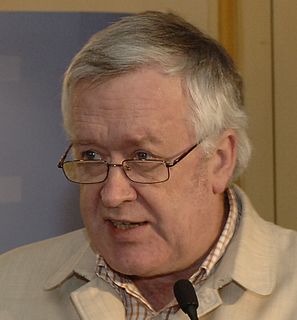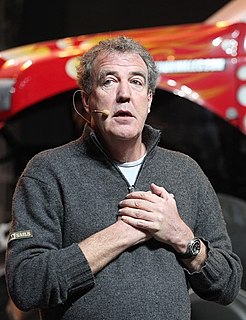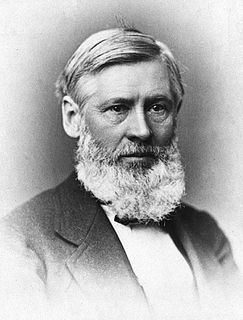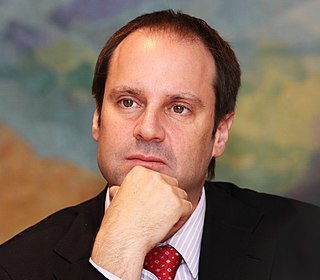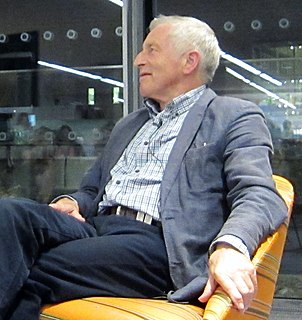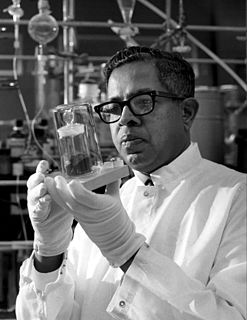Top 1200 Carbon Dioxide Emissions Quotes & Sayings - Page 19
Explore popular Carbon Dioxide Emissions quotes.
Last updated on December 2, 2024.
Every company that manufactures something is causing some damage either to the soil or water or air. Most companies treat these as externalities. But the growing movement of sustainability calls for companies to internalize these costs. Once companies do this, they will have a strong incentive to reduce their carbon footprint.
It is impossible to talk about slowing climate change without talking about reducing CO2 emissions. Equally, it is impossible to talk about adapting to climate change without considering how we will feed ourselves. And it is out of the question that we can adapt agriculture without conserving crop diversity.
It is in fact necessary to reduce CO2 emissions. There is no reason why we shouldn't spend our vacations on (the North Sea island of) Sylt instead of in the Seychelles, or drive more economical cars - for the sake of preserving increasingly scarce resources if nothing else. But that won't enable us to stop climate change. As long as China, India and the United States continue the way they have been, what we Germans do is more or less irrelevant.
I know that, except for carbon, there would be no life in the universe. Except for this one atom, there would be no life. Well, why? When you think about it, it does get spooky. Encountering these molecules are spiritual experiences similar to what I remember in church as a child, only these are more serious.
Globally, emissions may have to be reduced, the scientists are telling us, by as much as 60% or 70%, with developed countries likely to have to make even bigger cuts if we're going to allow the developing world to have their share of growing industrial prosperity...The Kyoto Protocol is only the first rather modest step. Much, much deeper emission reductions will be needed in future. The political implications are mind-blowing.
Does anyone really imagine for a moment that my wife gives two stuffs about global warming? She certainly did not appear to be all that bothered on Thursday evening when, during the great carbon-saving switch-off, I ran round the house furiously turning on every light, hair dryer, dishwasher and toaster.
Even if every major government were to slap huge taxes on carbon fuels - which is not going to happen - it wouldn't do much to halt climate change any time soon. What it would do is cost us hundreds of billions - if not trillions - of dollars, because alternative energy technologies are not yet ready to take up the slack.
We don't need a War on Carbon. We need a new prosperity that can be shared by all while still respecting a multitude of real ecological limits - not just atmospheric gas concentrations, but topsoil depth, water supplies, toxic chemical concentrations, and the health of ecosystems, including the diversity of life they depend upon.
We will pay for this [climate change] one way or another. We will pay to reduce greenhouse-gas emissions today and we'll have to take an enormous hit of some kind. Or we will pay the price later in military terms. And that will involve human lives. There will be a human toll. There is no way out of this that does not have real costs attached to it.
In the wake of the disaster caused by Tropical Storm Sandy, various allies of the Obama campaign have rushed to claim that the event was caused by anthropogenic global warming, thereby justifying the president's program of crushing the economy with regressive carbon taxes, a supposedly necessary measure to prevent future bad weather.
Many of the artifacts of my house had become potential devices for my own destruction: the attic rafters (and an outside maple or two) a means to hang myself, the garage a place to inhale carbon monoxide, the bathtub a vessel to receive the flow from my opened arteries. The kitchen knives in their drawers had but one purpose for me.
The international equity question arises from the costs of climate change itself and mitigation varying greatly across countries. It is affected by the historical responsibility for current greenhouse gas emissions, which countries which were not responsible for what's in the atmosphere now think are very important. Currently rich countries don't think those issues are very important.
Ecology also teaches that all life on earth can be viewed as a competition among species for the solar energy captured by green plants and stored in the form of complex carbon molecules. A food chain is a system for passing those calories on to species that lack the pant's unique ability to synthesize them from sunlight.
I think it's important that people think about what they are doing and that includes what they are eating. I am 61 now and attitudes towards drinking and driving have changed radically since I was a student. People change their notion of what is responsible. They will increasingly ask about the carbon content of their food.
To reduce modern climate change to one variable, CO2, or a small proportion of one variable - human-induced CO2 - is not science. To try to predict the future based on just one variable (CO2) in extraordinarily complex natural systems is folly. Yet when astronomers have the temerity to show that climate is driven by solar activities rather than CO2 emissions, they are dismissed as dinosaurs undertaking the methods of old-fashioned science.
As currently written, the laws require certain manufacturers and users of such chemicals to report any and all environmental releases-either accidental or routine-to air, water, or soil. The Toxics Release Inventory is the main registry of such events, and it is available to the public through the Environmental Protection Agency. It is hardly comprehensive. Toxic emissions reported to the federal government are thought to account for only 5 percent of all chemical releases.
We're clearly not going to stop global warming at this point. We've already raised the temperature of the planet one degree. We've got another degree in the pipeline from carbon we've already emitted. What we're talking about now is whether we're going to have a difficult, difficult century, or an impossible one.
You go into a community and they will vote 80 percent to 20 percent in favor of a tougher Clean Air Act, but if you ask them to devote 20 minutes a year to having their car emissions inspected, they will vote 80 to 20 against it. We are a long way in this country from taking individual responsibility for the environmental problem.
The money economy thus leaves a large ecological footprint, defined as the amount of land and resources required to meet a typical consumer's needs. For example, with only about 4% of the world's population, the United States, the largest money economy, consumes in excess of one-quarter of the world's energy and materials and generates in excess of 25 percent of the world's greenhouse gas emissions.
Politicians can either keep listening to a small number of polluting fossil fuel companies, who're keen to profit from keeping us hooked on oil, coal and gas, or they can listen to the majority of other voices from civil society to business calling for an urgent switch to low and zero carbon heat and power.
All over the world, social innovation is tackling some of the most pressing problems facing society today - from fair trade, distance learning, hospices, urban farming and waste reduction to restorative justice and zero-carbon housing. But most of these are growing despite, not because of, help from governments.
Some 3 million years ago, when the earth was a little more than 3°C warmer than preindustrial levels (about 2.2°C warmer than today), Antarctica had far less ice and sea levels were a stunning 25 meters higher than today. If we stay on our current emissions path, the planet will almost certainly be that warm by the century's end.
The problem of environmental children's health is very urgent in Russia. Environmental situation now is the main factor, which determines young generation's health... the volume of pollutant emissions in atmosphere and water grew and scale of ecological man-caused catastrophes increased. More than half of Russian territories, where 60-70 percent of the of population lives, have unsafe ecological situation.
We have not done the things that are necessary to lower emissions because those things fundamentally conflict with deregulated capitalism. ... We are stuck because the actions that would give us the best chance of averting catastrophe - and would benefit the vast majority - are extremely threatening to an elite minority that has a stranglehold over our economy, our political process, and most of our major media outlets.
Measured against the Problem We Face, planting a garden sounds pretty benign, I know, but in fact it’s one of the most powerful things an individual can do - to reduce your carbon footprint, sure, but more important, to reduce your sense of dependence and dividedness: to change the cheap-energy mind.
The billions being spent on Trident replacement would be much better spent on investing in developing the infrastructure we need for a zero-carbon economy, as well as in protecting public services. To use the money on a project that makes Britain and the world a far more dangerous place is politically irresponsible and economically obscene.
From wherever the emissions come, they have the same effect: They trap much more heat from the sun, melt the ice, raise the sea level, cause stronger storms, floods, drought, bigger fires, generate millions of climate refugees, destabilize political systems, threaten the growing of food crops and cause a number of other catastrophic consequences which, taken together, threaten the basis for the future of human civilization on the Earth.
It is critical that the world captures every last bit of energy efficiency, if we are to reduce greenhouse gas emissions enough to keep below dangerous rises in temperature. I am pleased that this important new study shows how information and communication technology can play an essential role in saving energy. Now we need more and effective government policies that reward such action and penalize delayed responses.
Carbon capture and storage, its commercial development.. is going to be the key to the future of coal. If it is successful commercially, then the Australian coal sector will be a center of prosperity and growth; if it's not successful then it won't be. I think in the long run it's as simple as that.
That's why we call for a New Deal prototype. Which means we are creating the jobs - nationally funded program but locally controlled - with guidelines to achieve 100% clean renewable energy through wind, water and sun by 2030. Also to create a sustainable food system, since this is a major portion of climate emissions, and also calling for public transportation as well as infrastructure restoration including in that ecosystem restoration.
I think we need to address greenhouse gas emissions. But I try to get involved in issues where I see a legislative result... So I just leave the issue alone because I don't see a way through it, and there are certain fundamentals, for example nuke power, that people on the left will never agree with me on. So why should I waste my time when I know the people on the left are going to reject nuclear power?
War and, apparently, hurricanes are very good for the oil business. But I've got to believe at a certain point, as a nation, we're going to go in a different direction toward an increased sense of personal responsibility, a lowering of each individual's carbon footprint and a real collaborative effort to help sustain our planet.
Think of the actual physical elements that compose our bodies: we are 98 percent hydrogen and oxygen and carbon. That's table sugar. You are made of the same stuff as table sugar. Just a couple of tiny differences here and there and look what happened to the sugar: it can stand upright and send tweets.
For carbon-neutral cities, there are things worth talking about in how our consumption patterns can change - sharing goods, etc. - but those are a fraction of the impacts of transportation and building energy use. If we need to choose priority actions, the most important things are to densify, provide transit, and green the buildings.
I am now certain that we have no alternative but to reduce urgently the levels of carbon that we are still pumping into the atmosphere as though tomorrow simply didn't matter. If we don't act collectively and individually, our children and their children will reap a whirlwind which will obliterate their civilisation.
We can come up with a working definition of life, which is what we did for the Viking mission to Mars. We said we could think in terms of a large molecule made up of carbon compounds that can replicate, or make copies of itself, and metabolize food and energy. So that's the thought: macrocolecule, metabolism, replication.
In a fair society, the solution to unemployment is not to force people into workfare programmes which do little more than supply big companies with free labour. It's to create jobs that pay a living wage, for example, by investing in new sustainable infrastructure projects and boosting the jobs-rich low carbon economy.
God, we don't have nearly enough skilled carpenters, electricians, plumbers for the work that needs to be done in taking every single building in Canada and making it carbon-zero, a net-neutral building, by improving insulation, modernizing furnaces, improving the geothermal possibilities, heat pumps.





